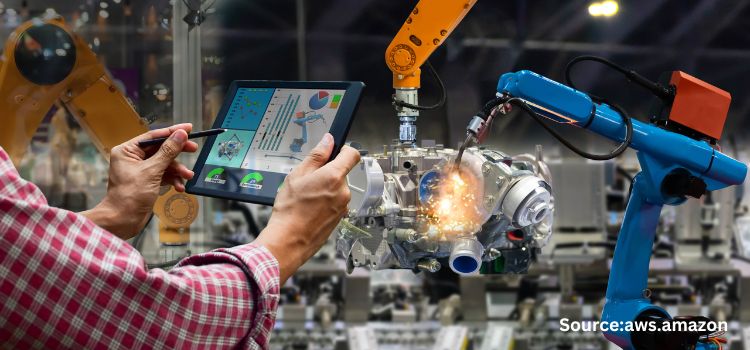
Europe Distributed Control System (DCS) Market by Component (Hardware, Software, and Services), by Project Type (New Construction, Replacement and Upgrade and Expansion), by Application (Batch and Continuous Process), by End User (Oil & Gas, Chemicals & Refining, Energy & Power, Pulp & Paper, Metals & Mining, Pharmaceutical & Biotech, Food & Beverages, Cement & Glass, Water & Wastewater, and Others) – Opportunity Analysis and Industry Forecast, 2024-2030
Industry: Semiconductor & Electronics | Publish Date: 25-Feb-2025 | No of Pages: 244 | No. of Tables: 168 | No. of Figures: 113 | Format: PDF | Report Code : SE934
Market Overview
Europe Distributed Control System (DCS) Market was valued at USD 7.92 billion in 2023, and is predicted to reach USD 11.11 billion by 2030, with a CAGR of 4.9% from 2024 to 2030. Distributed control system (DCS) is a type of computer-based control system used to control and monitor automation in industrial processes. It consists of a network of controllers that are distributed throughout an industrial facility and communicate with each other to coordinate and automate the industrial process. DCSs are used in a wide range of industries including chemical & petrochemical, pharmaceutical, foods & beverages, and power generation.
They are particularly useful in large-scale industrial processes that require a high degree of automation and control, such as oil refineries, chemical plants, and power stations. It is used to control and monitor various processes such as drilling, refining, blending, manufacturing, filtration, and disinfection to ensure high quality, efficiency, and safety.
Advantages of using a DCS include improved process control, increased efficiency and safety, and reduced downtime. By distributing control functions across multiple controllers, DCSs can provide redundancy and fault tolerance, ensuring that industrial process continues to operate even if one controller fails.
DCSs are an essential component of modern industrial automation systems and their use can help to improve reliability and efficiency of industrial processes. In addition, DCS can also help to improve safety in industrial processes by providing real-time control and monitoring the process. It can detect potential safety hazards and alert operators to take corrective action. DCS can help with predictive maintenance, allowing for proactive maintenance to reduce downtime. It also collects and analyzes data from sensors and provides insights for continuous process improvement.
Rising Demand for DCS in Industrial Automation for Enhanced Efficiency
The increasing integration of industrial automation in manufacturing, process industries, and utilities is driving a surge in demand for Distributed Control Systems (DCS). DCS systems are instrumental in improving operational efficiency and productivity, providing real-time control, data analysis, and process optimization. This aligns perfectly with the overarching industry-wide shift towards automation across diverse sectors, underscoring their pivotal role in enhancing overall industrial performance and competitiveness.
DCS: A Driving Force for Energy Efficiency and Sustainability in Europe
In an era marked by a heightened focus on energy conservation and environmental sustainability, Distributed Control System (DCS) technology emerges as a crucial enabler. By fine-tuning industrial processes, DCS systems efficiently manage energy consumption and reduce waste. This capability not only aligns with businesses' aspirations to diminish their carbon footprint but also enhances operational efficiency, making DCS a compelling choice for industries aiming to achieve both environmental and economic sustainability.
The Risk Associated with Cybercrimes Hampers the Market Growth in Europe
DCS systems are inclined to cyberattacks as they are networked and computerized. Cybercriminals can gain unauthorized access to DCS systems, compromise sensitive data, and disrupt critical infrastructure, causing significant financial losses and reputational damage. The consequences of a successful cyber-attack on a DCS system can be severe, especially in industries such as power generation, oil & gas, and chemical processing, where disruptions can have significant environmental and public safety implications.
Modular and Flexible DCS Systems: Unlocking Opportunities for Enhanced Automation
The introduction of modular and flexible DCS systems can create ample growth opportunities for DCS market. Traditionally, DCS systems have been highly centralized and monolithic, with large-scale installations that are expensive and complex to install and maintain.
However, introduction of modular and flexible DCS systems is changing this paradigm. Modular systems are designed to be more flexible and scalable, with a modular architecture that allows easy integration with other systems and components. This makes it easier to customize DCS systems to meet specific needs of individual organizations, without the need for costly and time-consuming customization.
These systems can help to improve production efficiency, reduce costs, and enhance product quality, which is expected to propel demand for DCS systems across a range of industries, including manufacturing, energy, and process industries.
ABB’s modular-enabled process automation solution that combines an orchestration layer is one of the major examples of modular and flexible DCS system. It also consists of a module layer integrated with module type packages (MTPs) technology for cost-effective modularization. This solution is designed to provide end-users such as mining, pharmaceuticals, and biotech with an automation solution that can fit their applications better than Programmable Logic Controllers (PLCs) and costs less than a traditional DCS.
Competitive Landscape
The Europe distributed control system (DCS) industry includes several market players such as ABB Ltd., Emerson Electric Co., Honeywell International Inc., Rockwell Automation, Schneider Electric, Siemens AG, Yokogawa Electric Corp, Toshiba International, Mitsubishi Electric, Valmet Oyj, Hitachi Global, Omron Corporation, Azbil Corporation, General Electric, Metso.
Europe Distributed Control System (DCS) Market Key Segments
By Component
-
Hardware
-
Controller
-
I/O
-
Workstation
-
Networking Hardware
-
-
Software
-
Service
-
Integration and Implementation
-
Managed Services
-
Support and Consultation
-
By Project Type
-
New Construction
-
Replacement
-
Upgrade and Expansion
By Application
-
Batch
-
Continuous Process
By End User Industry
-
Oil & Gas
-
Chemicals & Refining
-
Energy & Power
-
Pulp & Paper
-
Metals & Mining
-
Pharmaceutical & Biotech
-
Food & Beverages
-
Cement & Glass
-
Water & Wastewater
-
Others
By Geography
-
Europe
-
The UK
-
Germany
-
France
-
Italy
-
Spain
-
Denmark
-
Netherlands
-
Finland
-
Sweden
-
Norway
-
Russia
-
Rest of Europe
-
Key Players
-
ABB Ltd.
-
Emerson Electric Co.
-
Honeywell International Inc.
-
Rockwell Automation
-
Schneider Electric
-
Siemens AG
-
Yokogawa Electric Corp
-
Toshiba International
-
Mitsubishi Electric
-
Valmet Oyj
-
Hitachi Global
-
Omron Corporation
-
Azbil Corporation
-
General Electric
-
Metso
REPORT SCOPE AND SEGMENTATION:
|
Parameters |
Details |
|
Market Size in 2023 |
USD 7.92 Billion |
|
Revenue Forecast in 2030 |
USD 11.11 Billion |
|
Growth Rate |
CAGR of 4.9% from 2024 to 2030 |
|
Analysis Period |
2023–2030 |
|
Base Year Considered |
2023 |
|
Forecast Period |
2024–2030 |
|
Market Size Estimation |
Billion (USD) |
|
Growth Factors |
The rising demand for DCS in industrial automation The heightened focus on energy conservation and environmental sustainability. |
|
Countries Covered |
11 |
|
Companies Profiled |
15 |
|
Market Share |
Available for 10 companies |
|
Customization Scope |
Free customization (equivalent up to 80 working hours of analysts) after purchase. Addition or alteration to country, regional, and segment scope. |
|
Pricing and Purchase Options |
Avail customized purchase options to meet your exact research needs |

















 Speak to Our Analyst
Speak to Our Analyst




















